The Skinny on Artificial Sweeteners
Sugar has been linked to type two diabetes, obesity, and metabolic syndrome, which can lead to heart disease and stroke. Artificial sweeteners like Sweet n’ Low, Equal and Splenda are supposed to be better for you. But is that true?

Artificial sweeteners contain aspartame, sucralose, and saccharin which aren’t as healthy as some people may think. As stated by American Diabetes Association, there are five artificial sweeteners that have been FDA approved:
-
acesulfame potassium found in Sunett and Sweet One
-
aspartame found in Nutrasweet and Equal
-
saccharin found in Sweet ‘N Low, Sweet Twin, and Sugar Twin
-
sucralose found in Splenda
-
neotame found in A Sweet Leaf, Sun Crystals, Stevia, Truvia, and PureVia
These sweeteners can be used for many different things such as a sugar replacement in your morning coffee or a topping you can sprinkle on top of fruits.
Early studies showed that cyclamate mixed with a high doses of saccharin caused bladder cancer in laboratory animals. These studies led the U.S. National Toxicology Program’s Report on Carcinogens to remove saccharin in 2000 when in 1981, it was listed to be a cancer causing substance. On December 21, 2000 the removal of saccharin from the report led to revoking the warning label for products that contained it, according to National Cancer Institute. This is because studies have yet to prove if it can cause cancer in humans.
Aspartame was approved by the FDA in 1981, but that doesn’t mean you should keep using it. In 2005 a laboratory study showed that when you feed a male rat very high doses of aspartame, lymphomas and leukemia were found. Aspartame seems healthy but eating very high doses of it is equal to drinking eight to 2,083 cans of diet soda daily.
Not everything labeled “diet” or “no sugar” is healthy for you. It’s best to drink water, eat less sugary foods and stay active to avoid health problems in the future.



















